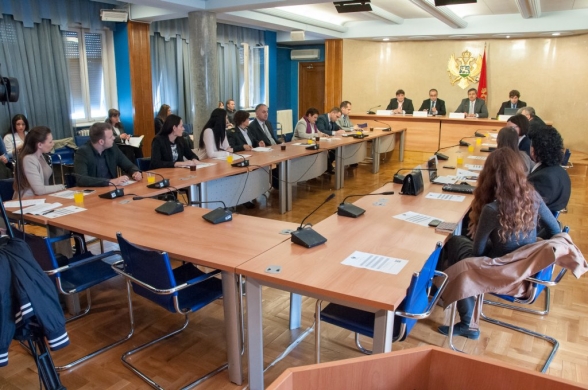Today's public debate of the Committee on European Integration was marked by discussions within negotiation chapter 29 - Customs union. The debate brought together representatives of European Union Delegation to Montenegro, MPs, representatives of state institutions, non-governmental sector and media, with the aim of discussing the content of the chapter.
In his opening statement, Mr Nikola Vukićević, member of the Negotiation Group and Assistant Minister of Finance says that Customs unionis one of the core stones of European integrations and key component of good functioning of internal European market. He also says that there are no obstacles for Montenegro when it comes to opening negotiations for chapter 29, and that Montenegro has been making great efforts in order to be fully prepared for accessing the European Union. Thus, there will be no measures for negotiations in this chapter, and Montenegro will not ask for transitional periods. He voices expression that by entering the Union, prices of products form the EU will be lower, and that Montenegro has an obligation to open the market that will be competitive with European market.
Mr Milan Martinović, member of the Working Group for the said chapter, spoke on technical aspects and specifies of the very chapter. With regard to that, he emphasises that in this field, apart from harmonising the legislation with the EU law, it is necessary to strengthen human resources, particularly in Customs Administration. For the needs of analytical review, as he says, around 30 experts from EU member states have been engaged. Answering the question posed by the representative of the Confederation of Trade Unions of Montenegro, Mr Martinović says that in terms of employment to Customs Administration, following the accession, there will be no customs control at the borders of member states, which may influence to the number of employees at the Administration, i.e. the need for retraining.
During the discussion, some interesting questions emerged, such as: consequences of bilateral agreements on trade relations of Montenegro with third countries, possibilities of export for products which are considered national even though their basic materials do not originate from Montenegro, as well as issues relating the systematisation in the Customs Administration and possibilities for opening new working positions
Committee Chairperson moderated the public debate, and apart from the members of the Committee on European Integration, the debate was attended by representatives of umbrella committees, whose jurisdiction is related to content of Chapter 29 - Representatives of the Committee on Economics, Finance and Budget and Anti-Corruption Committee.









